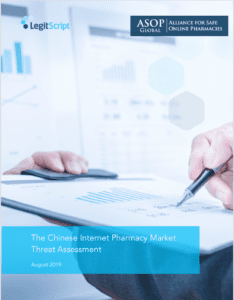New Report Highlights Continued Illicit Online Prescription Drugs Sales In China
Globally, the World Customs Organization estimates that sales of counterfeit medicine are a $200 billion a year industry. With a population of over 1.3 billion citizens, China is not immune to this issue. In 2001, an estimated 192,000 patients died in that country from fake drugs. Despite a ban on Internet pharmacies selling prescription drugs, a new report by The Alliance for Safe Online Pharmacies (ASOP Global) and LegitScript finds that about half of all Chinese online pharmaceuticals sellers are illicit. Though the number of illicit sellers is lower than the global average, patients in China still face the same dangers as consumers in other countries: counterfeit medicines, substandard medicines, financial fraud, and identity theft.
The Chinese Internet Pharmacy Market Threat Assessment report shows that efforts by the Chinese government to limit illicit online sellers have had successes, but there are additional opportunities for further regulation and enforcement policies. Chinese citizens gather in forums and on social networks to discuss treatments that have yet to be approved in the country or considered expensive. It is on these very same forums and social networks that illicit online sellers lure patients into making purchases. Many websites analyzed by ASOP Global and LegitScript appear to be only for informational purposes, but market themselves as being agents to “purchase on your behalf.”
A selection of keyword phrases was entered into the three most frequently used search engines in China that related to controlled substances, common disease names, and popular life-saving drugs. Seventeen percent of the search results came back from illicit websites that facilitated the sale of prescription medicine or controlled substances. Digging further into that dataset, 56 percent of those websites were Internet pharmacy websites dedicated to illicit online prescription drug sales. An analysis by keyword phrases found twice as many illicit results for life-saving drugs as there were for controlled substances. Among the Internet pharmacies selling life-saving medications, most claimed to source their medicines from India.
ASOP Global and LegitScript found that many of the websites in their dataset were not licensed pharmacies in China or India. Some websites marketed themselves as agents purchasing on behalf of patients, others claimed to buy from licensed pharmacies in India or other countries, and still others claimed to source their products from licensed drug suppliers. Verifying any of these claims would be difficult for a patient to do.
The use of social media and third-party platforms such as Weibo, Baidu Tieba, WeChat play a vital role in illicit online drug sales in China by allowing for the promotion of prescription drugs, validating the reliability of drug sellers, and educating patients about the drugs that are for sale. While China’s National Medical Products Administration (NMPA) has recently accelerated the approval process for new drug applications, there is still a gap between when a new drug becomes available in other parts of the world versus China. As long as that gap exists, patients will continue to turn to the Internet as a source of information and illicit prescriptions.
The report credited both the Chinese government and private sectors for work done to stop online drug sellers. Multiple indictments were filed in 2018 against individuals selling prescription drugs from India. The Chinese government also participates in Interpol’s Operation Pangea, a global operation that targets the online sale of counterfeit and illicit medicines and medical devices. Chinese Internet companies monitor for online drug sales. Still, the challenges of enforcing drug laws in the online space are difficult. However, the report noted that NMPA is working on a new online monitoring system that would be able to identify problematic online drug sellers more efficiently on third-party apps. Still, the Chinese government needs to continue educating its citizens about the risks associated with purchasing prescription drugs online.
